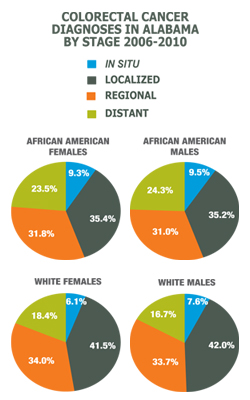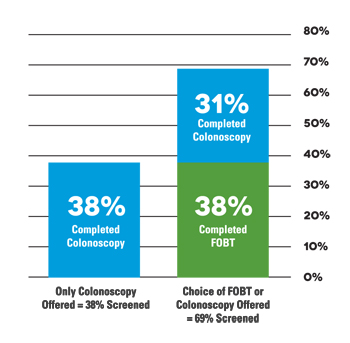For Health Care Providers
Interested in learning more about colorectal cancer (CRC) screening? Check out our Featured Articles.
For tools to educate yourself, your colleagues or your patients, visit Educational Materials.
For information about some of the different fecal immunochemical test (FIT) kits available, see Testing Kits.
About CLIA Waived Tests
Facilities do not need to have moderate or high-complexity laboratories to conduct FIT screening. CLIA waived FIT can be processed in any facility that holds a Certificate of Waiver (CW) from the Centers for Medicare and Medicaid Services (CMS). The fee for a CW is $150 every two years. More information and an application to obtain a CW are available from CMS.
The fecal immunochemical test (FIT) is a take-home stool test that is more sensitive at detecting both colorectal cancer (CRC) and adenomas than a quaiac fecal occult blood test (1). In addition to being a very accurate way to screen for CRC, the FIT is inexpensive, non-invasive, and addresses many of the barriers that patients face to CRC screening through colonoscopy.
The USPSTF recommendations for colorectal cancer screening methods include colonoscopy every ten years, flexible sigmoidoscopy every five years, or a fecal immunochemical test or high sensitivity fecal occult blood test annually.
Never use in-office FOBT at the time of a digital rectal exam as a screening test for colorectal cancer. Studies have shown that a single stool sample obtained at the time of an in-office digital rectal exam may miss up to 95 percent of cancers and significant adenomas.
Reasons To Offer The FIT In Your Practice
1. To Help Prevent CRC
From 2006-2010, 42.7 percent of CRC diagnoses in Alabama were made at a late stage (2). Widespread screening could find many of these cancers earlier when they are easier to treat.
According to the Alabama Statewide Cancer Registry 16.7 percent of colorectal cancers diagnosed in white males from 2006-2010 were discovered at Stage 4, 24.3 percent for African American males, 18.4 percent for white females, and 23.5 percent for African American females. Though the largest portion of cancers diagnosed were localized (approximately Stage 2), the nearly 50 percent of cancers diagnosed at late stage (Stage 3 or 4) represent a group of people who could have avoided extensive treatment and, in some cases, death with proper screening.
2. To Screen More Patients
 According to the Centers for Disease Control and Prevention (CDC) publication Vital Signs, "the best test is the test that gets done (3)." Many patients have inadequate insurance to cover colonoscopy, face barriers including time off work, childcare, and inability to be accompanied by an adult, or simply lack willingness to undergo the procedure.
According to the Centers for Disease Control and Prevention (CDC) publication Vital Signs, "the best test is the test that gets done (3)." Many patients have inadequate insurance to cover colonoscopy, face barriers including time off work, childcare, and inability to be accompanied by an adult, or simply lack willingness to undergo the procedure.
Consider offering patients screening options. Studies show that nearly double the number of people complete CRC screening when offered a choice between stool test and a colonoscopy, compared to a group of people offered colonoscopy alone (4). Given a choice between a colonoscopy every ten years or a take-home test every year, 47.6 percent of Alabamians chose a take-home test (5).
3. To Receive Reimbursement For Completed Tests
Take-home FIT/iFOBT screening is covered by major insurers in Alabama, including Blue Cross and Blue Shield of Alabama, Medicaid and Medicare. Medicare reimburses a generous $21.86 for a completed test (CPT Code: G0328QW). The average cost of a fit is around $7.
4. To Meet Clinical Quality Measures (CQM)
By choosing CRC as one of your CQMs, you can meet Meaningful Use objectives for stages 1 and 2.
Stage 1 Objectives
- Report Ambulatory CQMs to CMS
- Generate list of patients by specific condition to use for quality improvement
- Send patients reminders as needed for preventive follow-up care
Stage 2 Objectives
- Record patient family health history
- Incorporate clinical lab-test results into Certified EHR technology
- Identify patients who should receive reminders for preventive/follow-up care
- Use CPOE for medication, laboratory and Radiology Resources
- Identify patient-specific education resources
For more information about the types of FITs available, pricing, and purchasing, view our fact sheet, FIT to FIT comparison.
The FITWAY program also provides free materials to help you better utilize the FIT in your practice, like postcards that invite your patients to come in for screening, information cards and posters for your waiting room, postcards that remind your patients to return the completed FIT, even a pre-screening postcard that helps you and the patient determine whether the FIT is the right screening option for them by identifying patients at increased and high risk through a series of family and personal medical history questions. To view these materials visit Educational Materials. To request these free tools, email [email protected] or call (334) 206-3336.
The FITWAY Colorectal Cancer (CRC) Prevention Program has been funded since 2009 as part of the Centers for Disease Control and Prevention Colorectal Cancer Control Program (CRCCP). FITWAY seeks to increase CRC screening rates to 80 percent through population level approaches and evidence-based strategies. FITWAY works through guidance from Alabama's American Cancer Society (ACS) Roundtable partners and our Medical Advisory Board resulting in stronger efforts in worksites and in hospital systems. In order to increase public awareness, reduce structural barriers, and provide increased access to CRC screening, diagnostics, and treatment, FITWAY and its partners are promoting FIT/iFOBT screening in worksite wellness programs. CRC screening and awareness activities fit naturally in worksites.
References
1. Accuracy of Fecal Immunochemical Tests for Detecting Colorectal Cancer
2. Surveillance, Epidemiology, and End Results (SEER) Program (www.seer.cancer.gov) Research Data (2006-2010), Alabama Statewide Cancer Registry, released November 2013.
3. Colorectal Cancer Screening Tests Save Lives
4. Adherence to Colorectal Cancer Screening a Randomized Trial of Competing Strategies
5. Keith Nichols, Allen Perkins. Colorectal Cancer Screening in Alabama: Public Perceptions and Practices. University of South Alabama. A Telephone Survey of Alabama Residents. 2012.
Page last updated: February 18, 2026




